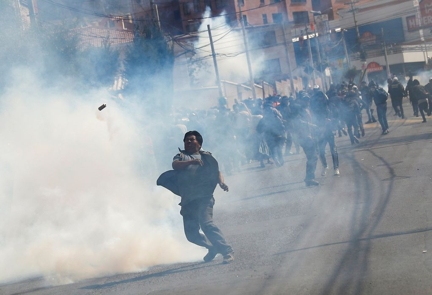
(above) A demonstrator throws back a tear-gas canister during a protest in La Paz, Bolivia, on Tuesday. Supporters and opponents of President Evo Morales hit the streets for a ninth day of demonstrations. (Kai Pfaffenbach/Reuters)
Bolivia election: U.S. withholds recognition; Morales supporters and opposition clash as sides await OAS audit
October 19, 2019 - Original article: Washington Post
By Rachelle Krygier
Supporters and opponents of Bolivian President Evo Morales returned to the streets Tuesday as they waited for international observers to audit the election that he says he won.
Security forces fired tear gas at demonstrators in La Paz. A day earlier, opposition protesters had built barricades in the capital and other cities; Morales supporters blocked highways and lit fireworks. Authorities say 30 people were injured when the sides collided in Santa Cruz, Bolivia’s largest city.
Bolivia’s elections tribunal says the socialist Morales beat runner-up Carlos Mesa in the first round of voting last week. Mesa, a former president who has united opposition parties on the left and right against Morales, has accused him of election fraud.
Bolivia’s election panel declares Evo Morales
winner after contested tally
Morales, who has led the South American nation for 13 years, has warned of a “coup attempt” to deprive him of a fourth term in office. But he also has invited the Organization of American States, the United States, Mesa and others to audit the vote. If the OAS finds evidence of fraud, Morales has said, he’ll agree to a second round of voting.
The Trump administration and others have withheld recognition of the result pending the audit. Mesa, meanwhile, says the audit could be useful but shouldn’t be considered the final word on the vote. Opposition protesters are no longer demanding a second round — they want a new election.
(below) Bolivian President Evo Morales, with Vice President Álvaro García Linera, celebrates his reelection in El Alto on Monday. Former president Carlos Mesa, Morales’s principal opponent, has accused him of election fraud. (Juan Karita/AP)
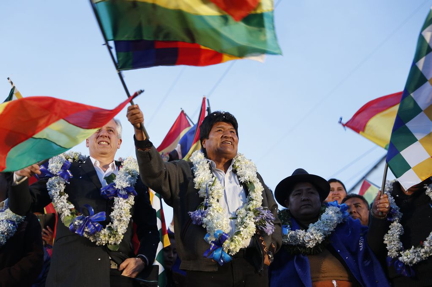
Mesa said Tuesday the opposition would continue to mobilize “until we achieve a path that leads to the exit of Evo Morales from the presidency in January 2020.”
Morales has warned that if protests continued, his rural supporters would besiege Bolivia’s cities, “to see if they can put up with it.”
The developments in some ways resemble the sequence of events that led to the current standoff in Venezuela. Venezuelan President Nicolás Maduro, a Morales ally, claimed victory last year in elections widely viewed as fraudulent. The United States withdrew recognition of Maduro, declared opposition leader Juan Guaidó Venezuela’s rightful leader and imposed economic sanctions on the already collapsing nation.
Socialism doesn’t work? An emerging middle
class of Bolivians would beg to differ.
A key difference is that Morales, who has presided over historic growth in one of the region’s most impoverished nations, remains popular in Bolivia. Maduro, the heir to Hugo Chávez in Venezuela, has little support in his country.
“Morales still has popularity and strength, and it remains possible that he will agree to go to a second round,” Amherst College political scientist Javier Corrales said. “He could still mobilize his base and stand a good chance.”
Morales, Bolivia’s first indigenous president, has taken a more pragmatic approach in economic and foreign policy, maintaining good relations with most of the West and keeping the country open to foreign investment.
(below) Demonstrators block a street in La Paz on Tuesday. The sign reads “Bolivia said no.” (Kai Pfaffenbach/Reuters)
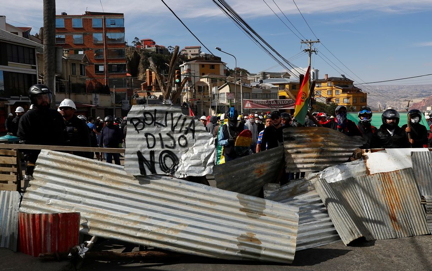
The elections tribunal says Morales beat Mesa by more than 10 percentage points in last week’s vote, enough to avoid a runoff election in December. But that was after an unexplained gap in posting results that lasted nearly 24 hours.
Preliminary returns after the polls closed Oct. 20 suggested the race was headed for a runoff, which analysts said Mesa had a strong chance of winning. When new results were posted the next day, the tally had swung in Morales’s favor.
Morales’s candidacy itself was controversial: After losing a referendum in 2016 that would have allowed him to sidestep term limits, he secured a court ruling that enabled him to run again anyway.
Why political turmoil is
erupting across Latin America
Protesters in La Paz and other cities last week set fires, looted election offices and tore down a statue of Chávez.
Bolivian officials say the OAS audit is expected to start in the coming days. The United States, Argentina, Brazil and Colombia have refrained from recognizing Morales and won’t if the OAS “is not able to verify results of the first round,” they said in a joint statement.
“We are deeply concerned over irregularities in the vote-counting process of #Bolivia’s Oct 20 elections,” Secretary of State Mike Pompeo tweeted Sunday. “We call on #Bolivia to restore electoral integrity by proceeding to a 2nd round of free, fair, transparent, & credible elections with the top two vote winners.”
The United Nations has backed the OAS audit; the European Union has called for a second round of voting.
Observers have not been announced for the audit. Morales has mentioned the United States, Argentina, Brazil and Colombia.
(below) A Morales supporter talks to a police officer Tuesday in La Paz. (Kai Pfaffenbach/Reuters)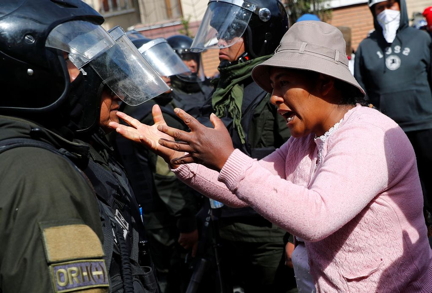
But opposition protesters say they won’t be bound by the results.
“People view the OAS audit as just a slogan,” Pablo Solón, a former ambassador under Morales who has turned against the president, told The Washington Post. “No one even understands how it works or when it will start or end.”
The National Coordinator for the Defense of Democracy, a committee of opposition parties and civil society groups, has said a second round wouldn’t stop what it has labeled the “mother of all battles” to pressure for a new vote.
Mesa, speaking to reporters in Santa Cruz on Tuesday, said that “new elections would be ideal” but that the opposition is “open to all options.”
Protests, arson, looting in Bolivia as opponents
accuse Evo Morales of trying to steal election
Solón, the ambassador turned critic, said the government’s strategy was clear.
“They’re instigating fear by having their supporters come out and clash with protesters while they also bet that the strength of the movement will wear out in the coming weeks,” he said.
“But for now the government is not being remotely able to control the chaos,” he said. “The biggest challenge for Evo is that the magnitude of this protest movement is simply unprecedented.”
(below) Bolivians protest Morales on Tuesday in La Paz. (Juan Karita/AP)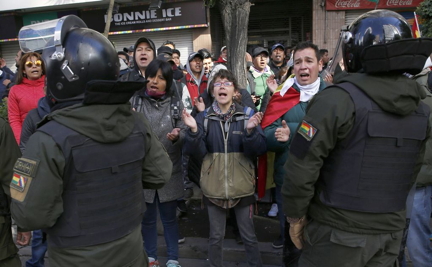
Argentina’s economy is collapsing. Here come the Peronistas, again.
Chile is the latest Latin American country to erupt in violent protest. Here’s why.
Ecuador’s indigenous people are leading the anti-government protests. They have a record of ousting presidents.